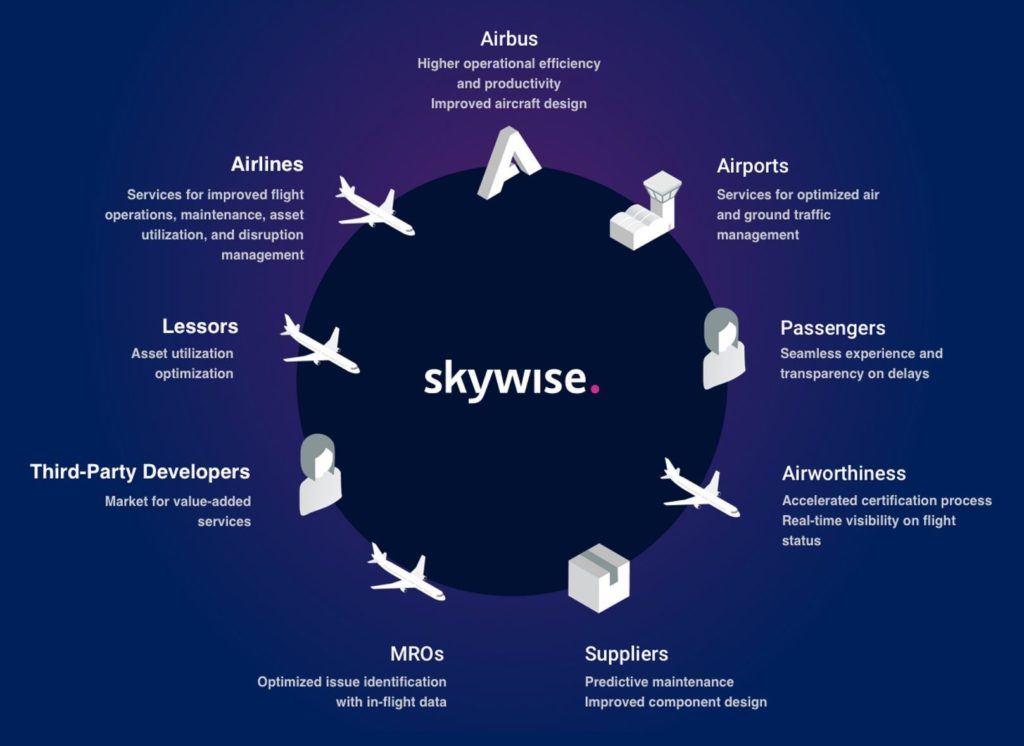Skywise: Bringing Data Analysis to the Airline Industry
Airbus launched its Skywise system to allow its airline customers to collect and better analyze their aircraft data with the goal of improving operations and reducing costs.
The global airline industry is constantly looking for ways to manage controllable costs (maintenance, fleet optimization, aircraft performance) as it responds to cost trends outside of its control (fuel prices, taxes, global growth trends, macroeconomic shocks). Against this backdrop, aircraft manufacturers seek to differentiate themselves by offering superior after sale services to further reduce the operating costs of their aircraft. In June 2017, Airbus launched its open aviation data platform, Skywise, “to support the digital transformation of the industry and add value for our customers’ operations”[1].
The Skywise platform is based on a data lake[2], hosted in the cloud, that allows airlines and other aeronautics players to store, manage and analyze their data and that of their ecosystem more efficiently. Offering visualization, alert management, predictive and machine learning capabilities, Skywise makes it possible to manage a fleet of aircraft over its entire lifespan, integrating all its operations and maintenance. One of the tangible benefits of the platform is to maximize the availability of a fleet of aircraft, increasing the operational and economic performance of the airline.[3]
In order to build the platform, Airbus partnered with Palantir (a global technology innovator in the data analytics pace). The Skywise system is powered by the Palantir Foundry platform, which has been used by several law enforcement, defense, and bank clients in the past.[4] By partnering with an existing firm rather than building the entire platform for scratch, Airbus was able to speed up the development cycle, reduce the upfront financial and time outlays needed to roll-out the system.
Airbus will need to convince many individual actors to pipe their data into the lake for it to be able to refine the predictive modeling tools it is seeking develop for its customers. To allay data security concerns, Airbus is allowing customers to maintain ownership of identifiable data and is only using anonymized data for the platform.
To further ease the burden of getting companies to use the data analytics capabilities of the platform, Airbus has pre-designed several data workflows to allow companies to answer some of their most common questions. The goal being to allow the platform to be used by both technical and non-technical users on the airline side.
The image below outlines the value the platform seeks to create for the key stakeholders in the aircraft ecosystem:
Value capture for this system is more complex. Airbus allows customers to access the platform for free (if they are contributing anonymized data). For more complex questions or in-depth consulting, companies can either pay Airbus or work with the myriad of advisory firms that also have access and familiarity with the platform. Value capture therefore largely comes in the form of increased airline engagement that Airbus hopes will translate to higher order volumes and the ability to command higher aircraft pricing.
[1] https://www.airbus.com/newsroom/press-releases/en/2017/06/airbus-commercial-aircraft-secures-almost–40-billion-of-new-air.html
[2] A data lake is a large repository for data storage
[3] https://www.adsadvance.co.uk/paris-air-show-capgemini-signs-up-to-airbus-skywise.html


